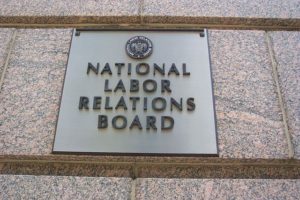 Recent decisions by the NLRB are affecting our union’s ability to organize workers and grow our union family. To help locals navigate these rulings, the International’s Legal Department has put together a summary of the most significant NLRB decisions that undermine workers’ rights and interfere with union organizing.
Recent decisions by the NLRB are affecting our union’s ability to organize workers and grow our union family. To help locals navigate these rulings, the International’s Legal Department has put together a summary of the most significant NLRB decisions that undermine workers’ rights and interfere with union organizing.
Here are the NLRB rulings every local should be aware of in terms of organizing.
First, the NLRB overruled a decision from the Obama era that allowed workers to use an employer’s email system to communicate about organizing and other union matters.
• Rio All-Suites Hotel & Casino: This new decision allows employers to restrict the use of their email systems to work-related communications only. Based on this decision, organizers and union representatives should avoid using workers’ employer-provided email addresses to contact them about union matters. Instead, it would be better to use workers’ personal email addresses for such communications.
In three recent cases, the NLRB significantly limited the ability of workers and union organizers to access employers’ property. In each of these decisions, the NLRB prioritized employers’ property rights over its responsibility to protect workers’ rights under the National Labor Relations Act.
• Kroger: In this decision, the NLRB changed the rules about when union organizers can access employers’ property. The board found that even if an employer allows other civic or charitable organizations to be on its property, the employer can nevertheless exclude union organizers by arguing that they are on the property to engage in different kinds of activities than other civic or charitable groups. The UFCW is currently appealing this decision.
• Tobin Center for the Performing Arts: In this case, the NLRB held that an employer could prevent the off duty employees of a symphony from hand billing at the auditorium where they usually performed because they were employed by the symphony, not the auditorium. This decision poses risks for any employees who are not directly employed by the facilities where they normally work.
• UPMC: The board changed the law to make it harder for union organizers to access cafeterias, snack bars, and other areas on employers’ property that are usually open to members of the public. In light of this decision, organizers should be careful not to distribute literature or union paraphernalia in cafeterias, snack bars or other areas on employers’ property, or to hop from table to table. If they do, the NLRB will rule that companies may kick them out.
The NLRB has changed the rules about protected concerted activity to make it harder for workers to stand up for themselves and their coworkers on the job. This will make it harder for workers to take the first steps necessary to organize a union.
• Alstate Maintenance: The NLRB found that a worker who spoke up on behalf of himself and his workers about an issue involving their pay was not protected. The NLRB upheld the company’s decision to fire that worker. To be careful, organizers should make sure to advise workers to speak up about workplace conditions as a group, not one by one.
The NLRB is attempting to make it harder to organize new unions through NLRB elections and card check alike. At the same time, the NLRB is trying to make it easier to decertify or withdraw recognition from existing unions.
• PCC Structurals and Boeing: In PCC Structurals and the recent Boeing decision, the NLRB created a new test for determining the appropriate bargaining unit for a union election. This test will make it harder for unions to win elections because it allows employers to pick and choose groups of workers who are more anti-union and insist that they be included in the unit.
• Johnson Controls: In this case, the NLRB decided that an employer can lawfully withdraw recognition from a union even when there is evidence that the union has not lost majority support in the workplace. Under the new rule, an existing union will have to go through a new election just to regain its rightful status as the workers’ bargaining representative.
Rulemaking: In 2014, the NLRB introduced new rules to minimize unnecessary litigation and delay during the period between the filing of an election petition and a union election. In December 2019, the NLRB decided to undo many of these improvements and to adopt new rules that will increase delay and give employers more opportunities to interfere with workers’ rights to join unions. Although the new rules will likely be challenged in court, they are currently scheduled to go into effect on April 16, 2020.
Finally, as we look ahead, the NLRB will likely issue a rule in the coming months that will threaten the stability of bargaining relationships established by card check and make it easier to decertify unions. The NLRB may also issue another rule making it harder for workers and union organizers to access employers’ property.
If you have any questions regarding any of these NLRB decisions, please contact Amanda Jaret in the Legal Department at ajaret@ufcw.org.
